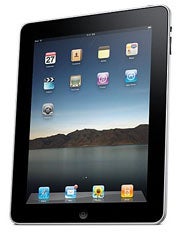Apple's iPad Wi-Fi + 3G is finally here. And now the trouble begins.
I believe that both the 3G-equipped iPad's sales and data usage will exceed expectations, meaning more people will be using more data than AT&T has planned for.
(See Related: iPad Wi-Fi + 3G: A Hands-On Look at Apple's Mobile Tablet)
Worse, other network-taxing developments may conspire with iPad data gluttony to overwhelm AT&T's mobile broadband capability, resulting in slowdowns and possibly even crashes. (Full disclosure: My wife works for AT&T.)
AT&T is now spending to enhance its mobile broadband network, but its precise network bandwidth capabilities are not publically known. We also don't know exactly how iPad sales will go, or what usage models will evolve. But what we do know isn't reassuring.
The trouble with iPad
 For an extra $130 over the iPad version that connects via Wi-Fi only, iPad Wi-Fi + 3G also connects from anywhere the AT&T cell phone data network is available.
For an extra $130 over the iPad version that connects via Wi-Fi only, iPad Wi-Fi + 3G also connects from anywhere the AT&T cell phone data network is available.
That higher hardware price gives you only the technical ability to connect. Actually connecting will cost you a monthly fee. For about $15 per month, you can download up to 250MB during that month. For $30 per month, you can enjoy unlimited data. No contract is required, and you can start or stop the data plan whenever you like, with ctivation or deactivation done directly from the iPad.
If you choose the 250MB plan and bump up against the limit, your iPad Wi-Fi + 3G will ask if you want to buy another 250MB-chunk of data, or upgrade to the unlimited plan. Limited-plan users will be constantly invited to upgrade, and many will probably do so.
It's reasonable to expect that advanced users will need more data than newbies, based on what we know about how people use laptops and cell phones. But just because it's reasonable doesn't mean it's true.
The iPad is different. Because iPad is the ultimate media consumption device, less technical people will tend to use more data.
So while we geeks will surf the Web, do e-mail and play multi-player games, less technical users will watch TV and movies, look at pictures on Facebook and do other bandwidth-intensive tasks. And there will be a lot of non-technical users with iPad Wi-Fi + 3G.
I'm not sure anybody -- not Apple, not AT&T -- understands or appreciates this yet. A lot of older people, students and the general public will replace much of their media consumption (or all of it) with iPad usage. College students will replace their home or dorm Wi-Fi network and opt for full-time iPad mobile broadband as their main doorway to the Internet, TV and movies.
Why AT&T may not be ready
As most iPhone users can tell you, AT&T's data network has gotten better in the past year, but it's still struggling. Text messages are often delayed. Web surfing can be slow.
And dare I mention the "T word?"
 AT&T Mobility chief Ralph de la Vega said in November 2008 that tethering, the use of a cell phone's mobile broadband connection to provide Internet access to another device, would come to the iPhone "soon." Apple also promotes tethering as a major iPhone feature. So why hasn't AT&T rolled it out?
AT&T Mobility chief Ralph de la Vega said in November 2008 that tethering, the use of a cell phone's mobile broadband connection to provide Internet access to another device, would come to the iPhone "soon." Apple also promotes tethering as a major iPhone feature. So why hasn't AT&T rolled it out?
AT&T told Engadget this week exactly why: The network isn't ready for the increased traffic that would result.
Wait, AT&T can't handle tethering but can deal with the iPad Wi-Fi + 3G?
The number of tethering users would almost certainly be far lower than the coming number of iPad 3G data users. And the data per user will probably be much, much higher on the iPad.
Tethering would be costly to users -- probably at least $30 per month in addition to the cost of mobile broadband -- which would be a disincentive for mass adoption. The best-case scenario for tethering is double the cost of unlimited iPad data.
Tethering usually isn't especially bandwidth intensive. Users plug in laptops at the airport to download e-mail before flights, or surf the Web a bit.
On the other hand, iPad users will be watching streaming TV shows from apps like the ABC Player, or movies via Netflix. (Note that early reports suggest that the ABC player requires a Wi-Fi connection, and that Netflix movies are lower quality over the 3G connection -- evidence of tension between the experience Apple wants to provide and the one AT&T can deliver.) A tsunami of apps will drive ever-increasing demands for bandwidth.
I'm predicting that the iPad Wi-Fi + 3G will be given to a huge number of older parents on Mother's and Father's Day. I've tested this demographic on iPad use -- they go straight to TV, movies and video -- the most bandwidth-intensive activities.
When the holidays hit -- forget about it. The iPad Wi-Fi + 3G will be given to people of all ages, including children and teens, who will take advantage of unlimited data plans.
So what do we know about tethering? First, AT&T can't currently handle iPhone tethering traffic. Second, tethering is going to be implemented at some unknown point in the future, a future where iPad Wi-Fi + 3G unlimited plans are already taxing the network.
AT&T has committed to providing data for all the iPad Wi-Fi + 3G devices and all the customers who choose its future tethering option. That's a lot of data -- and possibly more than AT&T can deliver.
Theo pcworld

0 comments:
Post a Comment